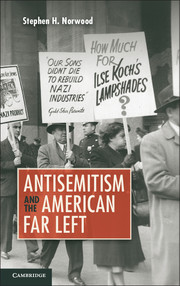Book contents
- Frontmatter
- Dedication
- Contents
- Photos
- 1 Promoting a Socialism of Fools
- 2 American Communists’ Tangled Responses to Antisemitism and Nazism, 1920–1939
- 3 World War II
- 4 Abandoning Assimilation
- 5 “Two, Four, Six, Eight, We Demand a Jewish State”
- 6 “Fiends in Human Form”
- 7 The Jewish Question Discarded
- 8 Shaping the Next Generations
- Notes
- Bibliography
- Index
8 - Shaping the Next Generations
The Persistence of Far Left Antisemitism, 1973–2012
Published online by Cambridge University Press: 05 June 2014
- Frontmatter
- Dedication
- Contents
- Photos
- 1 Promoting a Socialism of Fools
- 2 American Communists’ Tangled Responses to Antisemitism and Nazism, 1920–1939
- 3 World War II
- 4 Abandoning Assimilation
- 5 “Two, Four, Six, Eight, We Demand a Jewish State”
- 6 “Fiends in Human Form”
- 7 The Jewish Question Discarded
- 8 Shaping the Next Generations
- Notes
- Bibliography
- Index
Summary
The American far left remained fragmented and marginalized in the four decades following the New Left’s collapse in the early 1970s. It never commanded more than a small fraction of the New Left’s following. Nonetheless the far left continued to disseminate virulently anti-Zionist propaganda laced with antisemitism, serving as junior partner to Muslim student organizations and black nationalist groups that became the driving forces in an ever-expanding campaign to denigrate Israel and Jews. In the post-Vietnam era, the far left gave the Palestinian cause greater emphasis than any foreign policy issue. Mainstream liberals, particularly in academia, increasingly embraced much of the far left view of Israel. They often remained indifferent to manifestations of blatant antisemitism and even sometimes excused or shared responsibility for them.
By 1972, the New Left’s demise was acknowledged even by many of its most committed long-term activists. In the summer of that year, the two lead articles in Radical America, one of the New Left’s most prominent journals, were entitled “The Eclipse of the New Left: Some Notes” and “Beyond Reminiscence: The New Left in History.” Radical America’s editor, Paul Buhle, began the first article with the comment that the New Left no longer existed as a political movement: “Several years after the disintegration of the American New Left, there remains no significant political interpretation of [its] appearance, disappearance, and final meaning.” In the second article, James O’Brien similarly referred to the movement’s “disintegration” after 1969. He noted that the dominant mood among radical activists was one of “extreme pessimism and collective self-denigration.”
- Type
- Chapter
- Information
- Antisemitism and the American Far Left , pp. 208 - 240Publisher: Cambridge University PressPrint publication year: 2013



